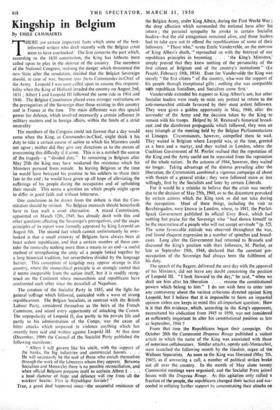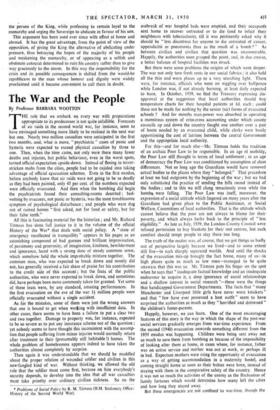Kingship in Belgium
By EMILE CAMMAERTS The members of the Congress could not foresee that a day would come when the King, as Commander-in-Chief, might think it his duty to take a certain course of action to which his Ministers could not agree ; neither did they give any directions as to the means of overcoming this difficulty if it arose. This is in a nutshell the source of the tragedy—a " divided duty." In remaining in Belgium after May 25th the King may have weakened the resistance which his Ministers pursued from outside. In leaving Belgium at the time he would have betrayed his promise to his soldiers to share their fate to the end ; he would have given up all hope of alleviating the sufferings of his people during the occupation and of upholding their morale. This seems a question on which people might agree to differ in good faith and without bitterness.. - One conclusion to be drawn from the debate is that the Con- stitution should be revised. No Belgian monarch should henceforth have to face such a cruel alternative. A mixed Commission, appointed on March 12th, 1949, has already dealt with this and other questions affecting the Sovereign's prerogatives, and the major principles of its report were formally approved by King Leopold on Augugt 5th. The second fact which cannot unfortunately be over- looked is that a small minority of Belgians have always been at heart ardent republicans, and that a certain number of them con- sider the monarchy nothing more than a means to an end—a useful method of strengthening the unity of a people linked together by a long historical tradition, but nevertheless divided by the language barrier. This conception of kingship may appear strange in this country, where the monarchical principle is so strongly rooted that it seems inseparable from the nation itself, but it is readily recog- nised on the Continent where monarchists and republicans have confronted each other since the downfall of Napoleon.
The creation of the Socialist Party in 1885, and the fight for general suffrage which followed, coincided with a wave of strong republicanism. The Belgian Socialists, in contrast with the British Labour Party, considered themselves as the heirs of the French Commune, and seized every opportunity of attacking the Crown. The unpopularity of Leopold II, due partly to his private life and partly to his administration of the Congo, was the cause of bitter attacks which surpassed in violence anything which has recently been said and written against Leopold III. At that time (December, 1909) the Council of the Socialist Party published the following manifesto: " Albert I will govern like his uncle, with the support of the banks, the big industries and commercial houses. . . . He will necessarily be the tool of those who enrich themselves through the work of the labourers whom they oppress. Between Socialism and Monarchy there is no possible reconciliation, and when official Belgium prepares itself to acclaim Albert I . . . a loud clamour of hope and defiance will rise from all the workers' hearts: Vive la Republique Sociakl" True, a great deal happened since—the successful resistance of the Belgian Army, under King Albert, during the First World War ; the deep affection which surrounded the national hero after his return ; the personal sympathy he awoke in certain Socialist leaders—but the old antagonism remained alive, and those leaders had to take care not to offend the republicanism of some of their followers. "Those who," wrote Emile Vandervelde, on the morrow of King Albert's death, " reproached us with the betrayal of our republican principles in becoming . . . ' the King's Ministers,' simply proved that they knew nothing of the personality of the first citizen of Belgium and of the country's institutions " . (Le Peuple, February 19th, 1934). Even for Vandervelde the King was merely " the first citizen " of the country, vibe- won the support of his people through 'exceptional gifts ; nothing else was compatible with republican Socialism, and Socialism came first.'
Vandervelde extended his support to King Albert's son, but other Socialist leaders were ready to seize any pretext to return to the anti-monarchist attitude favoured by their most ardent followers. They were given a golden opportunity in May, 1940, after the surrender of the Army and the decision taken by the King to remain with his troops. Helped by M. Reynaud's historical broad- cast and the slanderous propaganda which followed, they won an easy triumph at the meeting held by the Belgian Parliamentarians at Limoges. Circumstances, however, compelled them Co wait. They waited in Belgium where Leopold was, at the time, greeted as a hero and a martyr, and they waited in London, where the Coalition Government of M. Pierlot realised that the reputation of the King and the Army could not be separated from the reputation of the whole nation. In the autumn of 1944, however, they waited no longer. Taking advantage of the distress prevailing after the liberation, the Communists combined a vigorous campaign of abuse with threats of a general strike ; they were followed more or less willingly, first by the Socialists and later by certain Liberals.
For it would be a mistake to believe that the crisis was merely due to the decision of May 25th, 1940, or to the discontent provoked by certain actions which the King took or did not take during the occupation. Most of these things, including the visit to Berchtesgaden, were known in London, where, in 1941, the Pierlot- Spaak Government published its official Grey Book, which had nothing but praise for the Sovereign who " had shown himself to be the incarnation of a people who will not accept servitude " (p. 52). The same favourable attitude was observed throughout the war, and found eloquent expression in a number of speeches and broad- casts. Long after the Government had returned to Brussels and discussed the King's position with their followers, M. Pierlot, as late as September 19th, 1944, declared that the constant pre- occupation of the Sovereign had always been the fulfilment of his duty.
The speech of the Regent, delivered the next day with the approval of his Ministers, did not leave any doubt concerning the position of Leopold III. " I look forward to the day," he said, " when we shall see him after his liberation . . . resume the constitutional powers which belong to him." I do not wish here to enter into any controversy about the various criticisms directed against King Leopold, but I believe that it is impossible to form an impartial opinion unless one keeps in mind this all-important question: How is it that this evidence, which, according to the King's +opponents, necessitated his abdication from 1945 to 1950, was not considered as sufficiently important to alter his constitutional position as late as September, 1944 ?
From that time the Republicans began their campaign. On October 20th the Communist Drapeau Rouge published a violent article in which the name of the King was associated with those of notorious collaborators. Similar attacks, openly anti-Monarchist, were launched the following month by the Gaulois, organ of the Walloon Separatists. As soon as the King was liberated (May 7th, 1945), as if answering a call, a number of political strikes broke out all over the ,country. In the month of May alone twenty Communist meetings were organised, and the Socialist Press joined forces with the Drapeau Rouge. As this agitation only rallied a fraction of the people, the republicans changed their tactics and suc- ceeded in enlisting further support by concentrating their attacks on
the person of the King, while professing to remain loyal to the monarchy and urging the Sovereign to abdicate in favour of his son.
This argument has been used ever since with effect at home and abroad. It has the great advantage, from the point of view of the opposition, of giving the King the alternative of abdicating under pressure, thus betraying the hopes of the majority of his people and weakening the monarchy, or of appearing as a selfish and obstinate autocrat determined to ruin his country rather than to give way graciously to the storm. In this way the responsibility for the crisis and its possible consequences is shifted from the would-be republicans to the man whose honour and dignity were widely proclaimed until it became convenient to call them in doubt.







































 Previous page
Previous page